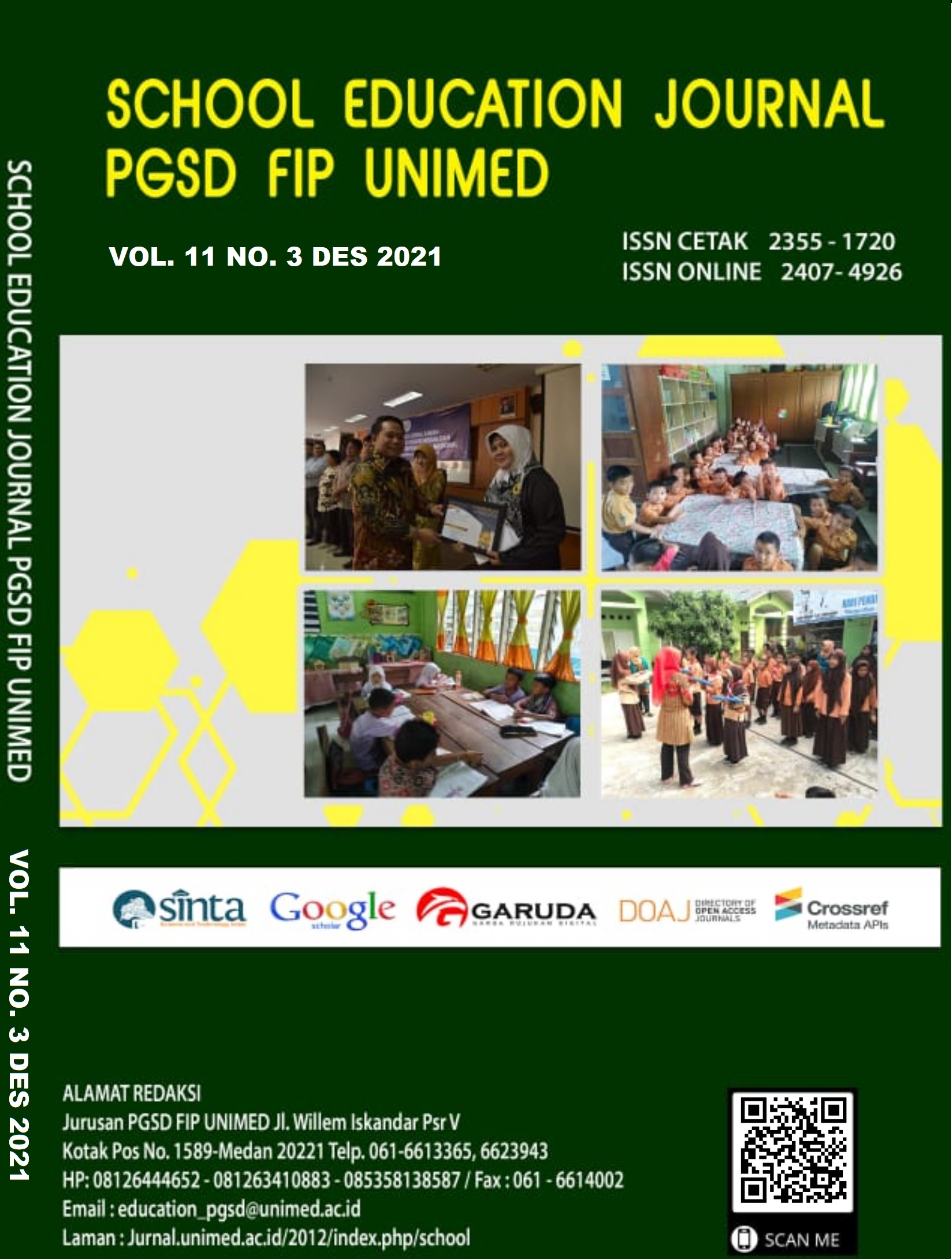ANALISIS FAKTOR MINIMNYA MINAT MEMBACA SISWA DI KELAS VI SDIT DAARUL ISTIQLAL KECAMATAN PATUMBAK KABUPATEN DELI SERDANG
DOI:
https://doi.org/10.24114/sejpgsd.v11i3.29137Abstract
This research is motivated by the lack of interest in reading elementary school students, especially at SDIT DarulIstiqlal. This study aims to find out what factors cause the lack of interest in reading in students in class VI SDIT DaarulIstiqlal, to find out the role of teachers to increase reading interest in class VI students at SDIT DaarulIstiqlal and to know the role of parents to increase reading interest in students VI. SDIT DaarulIstiqlal, class VI SDIT DarulIstiqlal, Patumbak District, Deli Serdang Regency. This research is descriptive research. The subjects of the study were sixth grade students, teachers and parents of students. Data collection techniques using observation, interviews, and questionnaires. The data analysis technique used descriptive qualitative. The results showed that the internal factors that caused the low reading interest of the sixth graders of SDIT DarulIstiqlalPatumbak were reading skills and lack of reading habits. External factors that cause students' low interest in reading are a less supportive school environment, the role of the library is not maximized, limited books/reading materials, less supportive families, and the influence of watching television and using mobile phonesKeywords: Causing factor, Interest in reading, ResearchReferences
Asniar, L O Muharam dan D P Silondae. 2020. œFaktor-Faktor Penyebab Rendahnya Minat Baca Siswa. J. Bening. Vol. 4 No. 1.
Keraf, G. 1996. Terampil Berbahasa Indonesia. Jakarta: Balai Pustaka.
Marwa. 2020. œPeran Guru dalam Meningkatkan Minat Belajar Peserta Didik Kelas IV pada Masa Pandemi Covid-19. Vol. 7. No. 2.
Mumpuni, Atikah dan Rizki Umi Nurbaeti. 2019. œAnalisa Faktor Yang Mempengaruhi Minat Baca Mahasiswa PGSD. Jurnal Riset Pedagogik. Vol. 3 No. 2.
Noor, Juliansyah. 2012. Metode Penelitian: Skripsi, Tesis, Disertasi dan Karya Ilmiah. Jakarta: Kencana
Prastisi, S. 2009. Membaca. Semarang: Griya Jawi.
Priyeti. 2017. œUsaha Meningkatkan Minat Baca Mahasiswa. Jurnal Pustaka Budaya. Vol. 6 No. 1.
Putri, ADS dan Suyitno. 2018. Analisis Minat Membaca Mahasiswa Semester V di PGSD UPGRIS. Jurnal Widya Wacana. Vol. 12 No. 2.
Rahim, F. 2008. Pengajaran Membaca di Sekolah Dasar. Jakarta: Bumi Aksara.
Rintang, K, dkk. 2019. œAnalisis Peran Guru dalam Meningkatkan Minat Baca Peserta Didik di Sekolah Dasar. Jurnal UNS.
Ruslan dan Sri Hayu Wibayanti. 2014. œPentingnya Meningkatkan Minat Baca Siswa. Universitas PGRI Palembang. Vol 12 No. 1.
Simbolon, Naeklan. 2014. Faktor-Faktor Yang Mempengaruhi Minat Belajar Peserta Didik.
Sugiyono. 2009. Metode Penelitian Kuantitatif, Kualitatif dan R&D. Bandung : Alfabeta.
Suryabrata, Sumadi. 2011. Psikologi Pendidikan. Jakarta: Raja Grafindo Persada
Tarigan, H. G.2008. Membaca sebagai suatu keterampilan berbahasa. Bandung: Angkasa Bandung.
Tarigan, H. G. 2008. Membaca Sebagai Suatu Keterampilan Berbahasa. Bandung: Angkasa Bandung.
Uswatun, Diyah. 2017. Perbedaan Kemampuan Membaca Anak Kelompok B Berdasarkan Gender di TK Se-Kecamatan Pundong Bantul. Skripsi.
Yogyakarta: Universitas Negeri Yogyakarta.
Yasinta, Iin Nur, dkk. 2020. Level Of Redability Of Indonesian Textbook: Gender Factor Analysis. PPJB-SIP. Vol 1 No. 2.
Downloads
Published
Issue
Section
License
Authors whose manuscripts are approved are approved as follows:
The publication rights for all journal manuscript materials published/published on the SEJ (School Education Journal) E-Journal site are held by the editorial board with the author's knowledge (moral rights remain with the manuscript authors).
The formal legal requirements for accessing this electronic digital journal article are subject to the terms of the Creative Commons Attribution-ShareAlike (CC BY) license, which means that E-Journal SEJ (School Education Journal) has the right to store, transfer media/format, manage in the form of a database, maintain, and publish articles without asking permission from the author as long as the author's name remains as the copyright owner.
Manuscripts published/published electronically are open access for educational, research, and library purposes.

